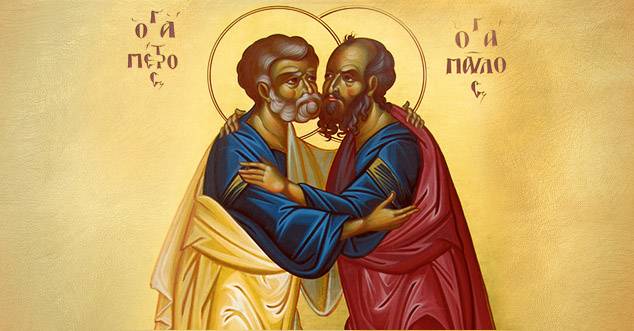
Happy and blessed beginning of the Apostolic Lent!
On Monday, July 1, the fast dedicated to the Holy Apostles begins, which lasts until the feast of the two chief apostles, Peter and Paul, on July 12. Since it ends on the day before St. Peter's Day, it is called St. Peter's Fast. This fast, the beginning of which is movable (because it depends on the Feast of Feasts), and the end of which is immovable, was established based on the memory of the apostles who, after the Descent of the Holy Spirit, and before going to preach the Holy Gospel, fasted (Acts 13:2- 3). Due to the dependence of the beginning of this fast on Easter, the Apostolic Fast can last for a minimum of one week and one day, and for a maximum of six weeks.
Fasting as an integral part of liturgical life
Georgije S. Deboljski: Days of worship (book about fasting) of the Orthodox Council of the Eastern Church (Apostolic Lent)
From the first Monday after Pentecost, i.e. after All Saints' Sunday, the Apostolic Fast begins, established before the feast of the Holy Apostles Peter and Paul, which we celebrate on June 29, and the Council of All Apostles - on June 30. We can call this multi-day fast a summer fast. Since it comes to us after Pentecost, in ancient times it was therefore called the Pentecostal fast, and now it is more often called Peter's, or even more correctly, Apostolic. After the descent of the Holy Spirit on the apostles, before the feast in their honor, the Church invites us to fast, having before us the example of the apostles themselves who, having received the Holy Spirit on the day of Pentecost, prepared themselves with fasting and prayer for preaching the Gospel to the whole world, and with fasting and prayer they accompanied the ordination of presbyters whose duty it was to continue the works of apostolic service (Acts 14:23); according to St. Chrysostom, the apostles always fasted. The ecclesiastical institution of fasting in honor of the Holy Apostles is discussed in the Apostolic Institutions, where it is said: "After Pentecost, celebrate one week and then fast; justice also demands that we rejoice because of the gifts received from God, but also that we fast, after putting on the body". Therefore, the beginning of Peter's fast dates back to the time of the apostles, when the celebration of Pentecost itself and the feast of the Holy Apostles, which, in fact, founded the Apostolic fast, date back.
The establishment of temples in Constantinople and Rome in honor of the first supreme apostles Peter and Paul, as well as the consecration of the temple of the Holy Apostles in Constantinople on the very day of the holiday, June 29, contributed to the spread and establishment of the Apostolic Fast among Orthodox Christians. How is the celebration of St. apostle after these events was more solemn and solemn, both in the East and in the West, and the spiritual preparation of pious Christians for this holiday - prayer and fasting - was even more established in the Orthodox Church. Ultimately, starting from the 4th century, the testimonies of the fathers about the Apostolic Fast became more frequent. In that century, St. speaks about him. Athanasius the Great, St. Ambrose of Milan, and in the 5th century, Leo the Great and Theodoret of Kir.
Saint Athanasius the Great, explaining to Emperor Constantius the troubles that Orthodox Christians suffer from the Arians, says in his apologetic speech: "The people who on the Sunday after St. He fasted on Pentecost, he went to the cemetery to pray..."
St. Ambrose says: "The Lord so ordained that we, having participated with Him in suffering during the Forties, now rejoice in His resurrection at the Pentecost." We do not fast at Pentecost because the Lord lived with us in those days; we do not fast because He Himself said: can the saints fast while the Bridegroom is with them (Lk 5:34)? Why is it necessary to abstain from food for the body, when the soul is nourished by the presence of the Lord? He who delights in the Lord's presence cannot fast! Communion with Christ is the necessary food for every Christian. Therefore, during Pentecost, we feed on the Lord who drew near and turned to us. After these days, since the Lord ascended to heaven, we fast again".
"Church fasts - says Leo the Great - are distributed throughout the year in such a way that a kind of abstinence law is set for each period of the year: in the spring - the spring fast in the Forties; in the summer - the summer after Pentecost..." "In addition, after the period of the Pentecost holiday - says Leo the Great - fasting is especially necessary in order to purify our thoughts with the feat of fasting and to be worthy of the received gifts of the Holy Spirit".
The same Saint says:
"Beloved, behind this celebration that the Holy Spirit sanctified with his descent, there usually follows a national fast, graciously instituted for the healing of the soul and body, and that is why we need to spend it with due reverence. Because we do not doubt that after the event in which the apostles were filled with the promised power from on high, and the Spirit of truth moved into their hearts, that among other secrets of heavenly teaching, according to the command of the Comforter, they were given the teaching of spiritual abstinence, so that our hearts , having cleansed herself by fasting, became more receptive to receiving gracious gifts. Although the Almighty Lord always helped the disciples of Christ, and the leaders of the resurrected Church were governed by God the Father, the Son and the Holy Spirit, it was still not easy for them to fight with the impending violence of the persecutors and the beastly threats of the wicked in a weakened body; this is for a reason, because what pleases our outer man most easily destroys the inner one, and vice versa: the more we mortify the body, the more the rational soul is purified. For this reason, the teachers, by the example and practice of those who enlightened all the children of the Church, filled the beginning of warfare for Christ with holy fasting, so that, going into warfare against spiritual debauchery, they would have suitable weapons in fasting, with which sinful lusts are deadened, since our invisible opponents and incorporeal enemies they cannot prevail if we do not give in to the lusts of the flesh. Although desires harm us - especially in temptation, they will still be without power and effect when they do not find a place in us from which it will be easy for them to attack us. But who among us, being clothed in an earthly body, even living at the highest level of perfection, can be so confident in his powers that he could consider himself out of danger offered by a corruptible body?! Of course, divine grace makes its saints victorious, but that does not abolish the feat of struggle itself. And we are obliged to consider this as the mercy of our Creator who, wishing that we, due to the wavering nature of our nature, are not proud of the victory we have won, never removes from us the possibility and the need to strive for new victories. For these reasons, an immutable and salutary custom was established that after the holy and joyful days we celebrate in honor of the Lord, who rose from the dead and then ascended to heaven, and after receiving the gifts of the Holy Spirit, we spend the scene of fasting. This custom should be diligently preserved for the sake of those gifts that have been made known by God and are now communicated to the Church. Since we have become the temple of the Holy Spirit, and even more, being watered with divine waters, we are not obliged to submit to any temptations; we are not obliged to serve anyone's vices, so that a virtuous life would not be defiled by anything impious. With God's help and cooperation, we can all achieve this only if, purifying ourselves through prayer and fasting, we strive to rid ourselves of sinful impurities and produce abundant fruits of love.
From the Apostolic rules inspired by God Himself, the leaders of the Church, by the will of the Holy Spirit, were the first to establish the practice that every pious feat should begin with fasting. They set it up like this for the simple reason that God's commandments can be properly fulfilled only when the army of Christ is fenced off from all sinful temptations by holy abstinence. So, beloved, we are obliged to practice it primarily at this time in which we are commanded to fast, since fifty days have passed from the resurrection of Christ to the descent of the Holy Spirit, and which celebration we spent especially solemnly. This fast is enjoined for the reason that it would preserve and pre-nourish us from levity, into which we can very easily fall because of the long-term wretchedness and resolution in which we delight; if the field of our body is not constantly cultivated, thorns and weeds can very easily grow and give us such a crop that is not gathered into granaries, but thrown into the fire to be burned. Therefore, we are obliged to preserve and nurture with all the necessary attention those seeds that we have received in our hearts from the heavenly Sower and thus prevent the envious enemy from somehow ruining what God has given us, and the thorns of vice from sprouting in the paradise of virtues. We can push away such evil only by almsgiving and fasting.
We are convinced that God Himself commanded all the Christian rules and that all the pious customs of the Church originated from the tradition of the apostles and the will of the Holy Spirit, who still lives in the hearts of believers, teaching them knowledge and reverence. Thus, we believe that the Holy Spirit, who descended in abundance on the fiftieth day after Passover, commanded, among other things, that we fast after the end of the current celebration, in order to teach us sobriety through abstinence, since satiety was the cause of sin."
"The fast of the apostles was instituted in their honor - says Saint Simeon of Thessaloniki - because thanks to them we were worthy to receive unspeakable goods, and they are the examples and executors of fasting, abstinence and obedience until death." This is unwittingly confirmed by the Latins themselves because they honor the apostles by fasting on the days dedicated to them; but we, in accordance with the decrees of the apostles compiled by Clement, after the descent of the Holy Spirit fast for one more week, and then the following week we honor the apostles, who handed over the fast to us, with fasting".
The duration of the Apostolic Lent is of different length, all depending on how early or late Easter is, which is celebrated on different dates in March and April. It always begins after the end of the Triode (Cvetnigo, pr. transl.), i.e. the last week of Pentecost, and ends on June 28, if the holiday of St. app. Peter and Paul is not on Wednesday or Friday. The longest duration of fasting is six weeks, and the shortest - one week and one day. The Church has preserved this different length of fasting since ancient times. This difference is also indicated in the Apostolic Institutions, when it is said: "After Pentecost, celebrate one week, and after that fast one (week)". Theodore Valsamon, patr. of Antioch, says: "seven and more days until the feast of Peter and Paul, all the faithful, i.e. laymen and monks are obliged to fast, and those who do not fast should be judged by the Orthodox Christian community".
However, the feat of fasting St. of the Apostles is much milder than the Fast of the Forties: during the Apostolic Fast, the Constitution of the Church prescribes on three days of the week - Monday, Wednesday and Friday - abstinence from fish, wine and oil, commanding at the ninth hour, after vespers, dry food; on other days abstinence only from fish. In the days of commemoration of one of the great saints, or in the days of temple glory that occur during the fast of St. of the Apostles, as well as on Saturdays and Sundays during Lent, it is resolved to eat fish.
Happy and blessed beginning of the Apostolic Lent!
PHOTOS
RELATED ARTICLES
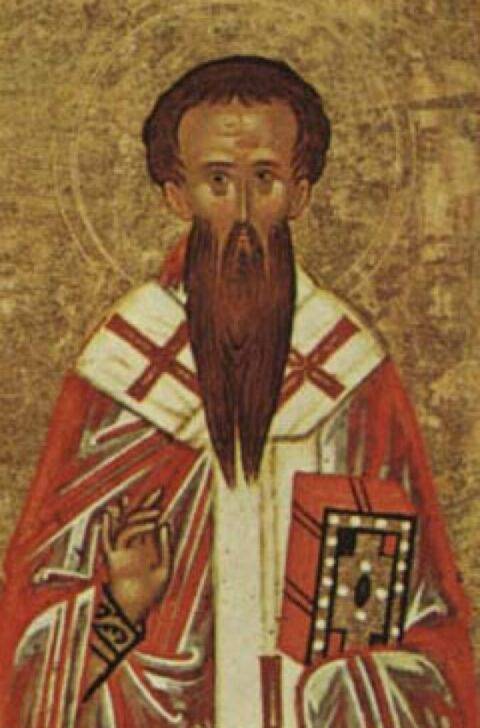
Calendar for April 25 Saint Basil the Confessor – Eastern Friday
A companion and martyr of Saint Procopius the Decapolis. Basil faithfully...
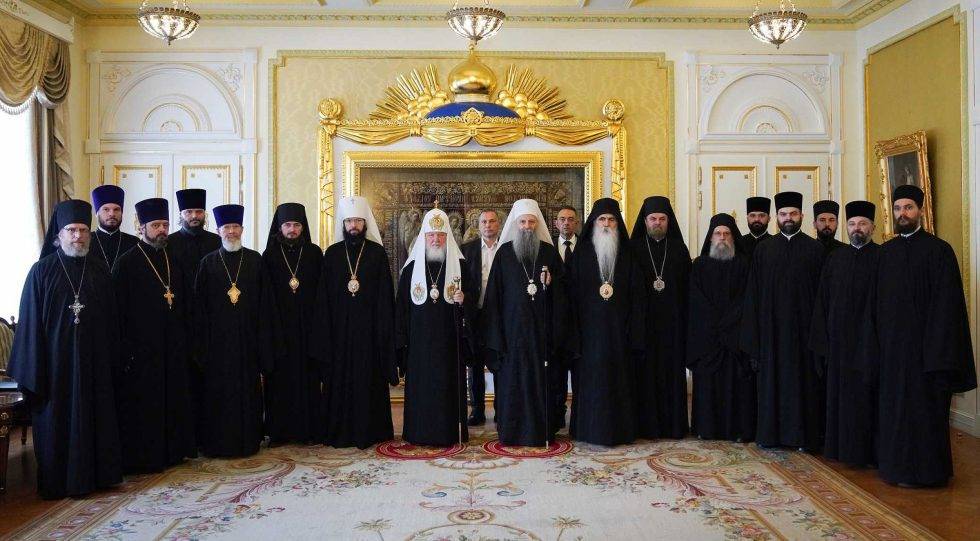
Serbian Patriarch Porfiry spoke with Patriarch Kirill of Moscow and All Russia
His Holiness Serbian Patriarch Porfiry, who is on a multi-day visit to Moscow...
Calendar for April 24 The Holy Martyr Antipas, Bishop of Pergamum
He is mentioned in the Book of Revelation as Antipas, my faithful witness...


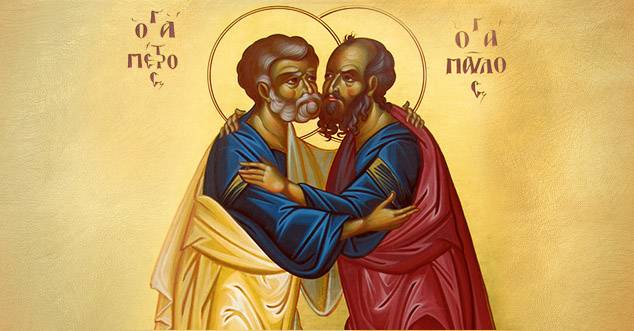

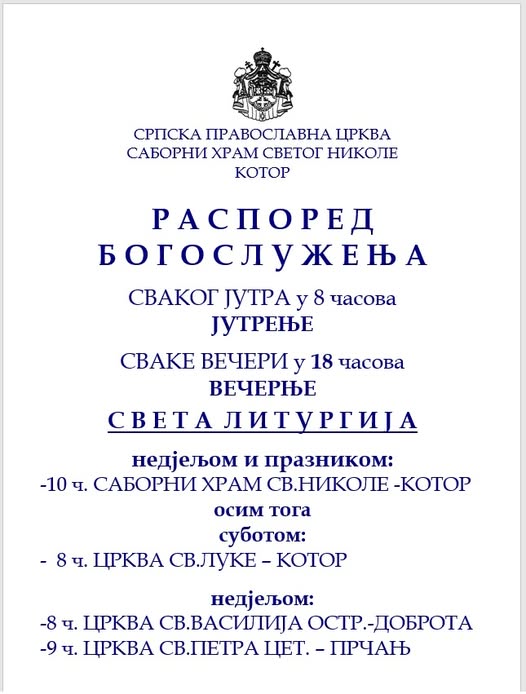
.png)